Click each session heading for further details and abstracts.
| 0700 – 1730 | Registration Open – Mezzanine Foyer | ||
| Grand Ballroom | |||
| Symposium Opening Chair: Dr Alyce Hancock, Executive Officer SOOS |
|||
| 0830 – 0900 | 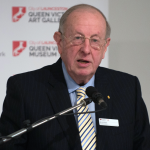 The Hon Sir Guy Green The Hon Sir Guy GreenPatron of Antarctic Tasmania, former Governor of Tasmania and Honorary Antarctic Ambassador Born in Launceston in 1937, Guy Green studied Law at the University of Tasmania and after being admitted to the bar in 1960, practised in Launceston. Intelligent, congenial, conciliatory and highly respected, an enthusiastic promoter of Tasmania, Guy Green was an obvious candidate for high office.Read More →Welcome to Country |
||
| 0900 – 0930 | Welcome from SCAR and SCOR
Yeadong Kim, SCAR President |
||
| Need for a Southern Ocean observing system Chair: Dr Alyce Hancock, Executive Officer SOOS |
|||
| 0930 – 1000 | 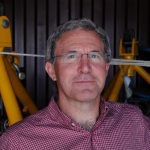 Plenary: Steve Rintoul CSIRO, Australia Dr Stephen R. Rintoul AO AAM FAA is a physical oceanographer and climate scientist at CSIRO Environment and the Australian Antarctic Program Partnership in Hobart. His research is focused on the role of the ocean in the climate system.Read More → |
||
| 1000 – 1030 | 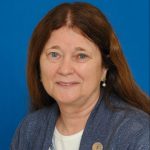 SOOS: Current activities and contribution to Southern Ocean Research SOOS: Current activities and contribution to Southern Ocean Research
Plenary: Prof Eileen Hofmann |
||
| 1030 – 1100 | Morning Refreshments | ||
| 1100 – 1230 | Creating impact for your observational data beyond research | Southern Ocean sea ice variability in a warming climate: observations and modeling approach | Human Engagement with the Southern Ocean: Science, Tourism, Environment |
| Grand Ballroom 1 Chair: Alyce Hancock |
Grand Ballroom 2 Chairs: Petra Heil, Marcello Vichi |
Grand Ballroom 3 Chairs: Hanne Nielsen, Elizabeth Leane |
|
| 1100 – 1115 | Creating impact for your observational data beyond research
Workshop |
Increased Antarctic sea ice variability and its drivers
Dr Will Hobbs |
Citizen Science in the Southern Ocean: Tourist PerspectivesDr Hanne Nielsen University of Tasmania |
| 1115 – 1130 | An abrupt transition in Antarctic sea ice–ocean system Alexander Haumann Alfred Wegener Institute / Ludwig-Maximilian-University Munich |
Public Support for Antarctic and Southern Ocean Science in Australia: Lessons from a National Survey Prof Elizabeth Leane University of Tasmania |
|
| 1130 – 1145 | Is the Antarctic sea ice already sweating? A glimpse into recent in-situ ice and snow data in the Weddell Sea Dr Stefanie Arndt Alfred-Wegener-Institut Helmholtz-Zentrum für Polar- und Meeresforschung |
FjordPhyto: A citizen science project that enriches travelers experience in Antarctica Allison Cusick Scripps Institution of Oceanography |
|
| 1145 – 1200 | Measuring up: Antarctic sea ice in the Earth system Dr Petra Heil AAD & AAPP, University of Tasmania |
Stories of the far south: Why Antarctica needs an intersectional lens. Kimberly Aiken University of Tasmania |
|
| 1200 – 1215 | The complexities of estimating sea-ice production from field observations with implications for model-based estimates and for ice-climate and ice-ecosystem interactions Dr Sharon Stammerjohn University of Colorado Boulder |
From historical humpback whale catch data to climate model evaluations in the Southern Ocean Prof Marcello Vichi University of Cape Town |
|
| 1215 – 1230 | East Antarctic Coastal Current and its influence on summertime sea ice distribution Dr Phil Reid Australian Bureau of Meteorology |
Updates on the SCAR Antarctic Biodiversity Portal GBIF Hosted Portal Dr Anton Van De Putte Royal Belgian Institute for Natural Sciences/Université Libre de Bruxelles |
|
| 1230 – 1330 | Lunch West Antarctic Peninsula and Scotia Arc Regional Working Group Meeting – Grand Ballroom 3 |
||
| 1330 – 1530 | Creating impact for your observational data beyod research & How to in SOOSmap | Plankton Diversity, food web dynamics and biogeochemical cycle in the Southern Ocean | Observations to understand ocean dynamic processes |
| Grand Ballroom 1Chair: Alyce Hancock |
Grand Ballroom 2 Chairs: Sarat Chandra Tripathy, Ruth Eriksen, Toru Hirawake, Kazuhiro Yoshida, Kerrie Swadling, Luke Brokensha |
Grand Ballroom 3 Chairs: Helen Phillips, Annie Foppert, Laura Herraiz-Berreguro |
|
| 1330 – 1345 |
Creating impact for your observational data beyond research Workshop |
The effect of iceberg melt on nutrient stoichiometry and primary producers Dr Mark Hopwood SUSTech |
Observational evidence of cold filamentary intensification in an energetic meander of the Antarctic Circumpolar CurrentMaya Jakes IMAS, University of Tasmania |
| 1345 – 1400 | Inter-annual variability of POM dynamics and its implications on the biological pump in the Indian sector of the Southern OceanDr Melena Soares National Centre For Polar And Ocean Research |
Physical controls on ventilation and air-sea exchange in Drake Passage Lilian Dove Caltech |
|
| 1400 – 1415 | Macrozooplankton food-webs across the South Georgia shelf region, and their relationship to Antarctic krill abundanceAnona Griffiths Imperial College London |
Mixing and water mass modification over Discovery Bank, in the Weddell Scotia Confluence of the Southern OceanDr Alexander Brearley British Antarctic Survey |
|
| 1415 – 1430 | Diversity patterns of prokaryotic communities in the Scotia Sea and Bransfield Strait during summer 2019 Mireia Mestre Museo Nacional de Ciencias Naturales (MNCN-CSIC) |
How much Upwelling occurs in the Abyssal Bottom Boundary Layer? Emeritus Professor Trevor McDougall University of New South Wales |
|
| 1430 – 1445 | Risks of Poleward Expansion of Harmful Dinoflagellates in the Southern Ocean Dr Ji Li Shanghai Jiao Tong University |
Revisiting circulation and water masses over the East Antarctic margin (80-150°E) Dr Kaihe Yamazaki Institute for Marine and Antarctic Studies, University of Tasmania |
|
| 1445 – 1500 |
How to in SOOSmap Workshop |
Microplastic studies in the coastal waters of South Australia Anastasiia Snigirova Flinders University |
Diapycnal and isopycnal mixing along the continental rise in the Australian–Antarctic Basin Dr Katsuro Katsumata JAMSTEC |
| 1500 – 1515 | Seasonal overview of oceanography and AABW formation in the Cape Darnley region, Antarctica Sienna Blanckensee The University of Queensland |
||
| 1515 -1530 | Tracing Antarctic freshwater from the grounding zone to the ice front in the Ross Embayment Matthew Siegfried Colorado School of Mines |
||
| 1530 – 1600 | Afternoon Refreshments | ||
| Circumpolar observations and programmes Chair: Irene Schloss, Austral Center For Scientific Research (CADIC-CONICET), Argentinian Antarctic Institute, Nat Univ of Tierra del Fuego |
|||
| 1600 – 1700 | 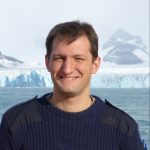 Plenary: Andrew Meijers British Antarctic Survey, UK Andrew Meijers is a physical oceanographer at the British Antarctic Survey. He specialises in the large-scale ocean circulation and change around Antarctica, using both observations and climate models. Hailing from Tasmania, he undertook his PhD at the University of Tasmania.Read More → |
||
| 1730 – 1930 | 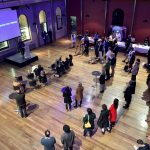 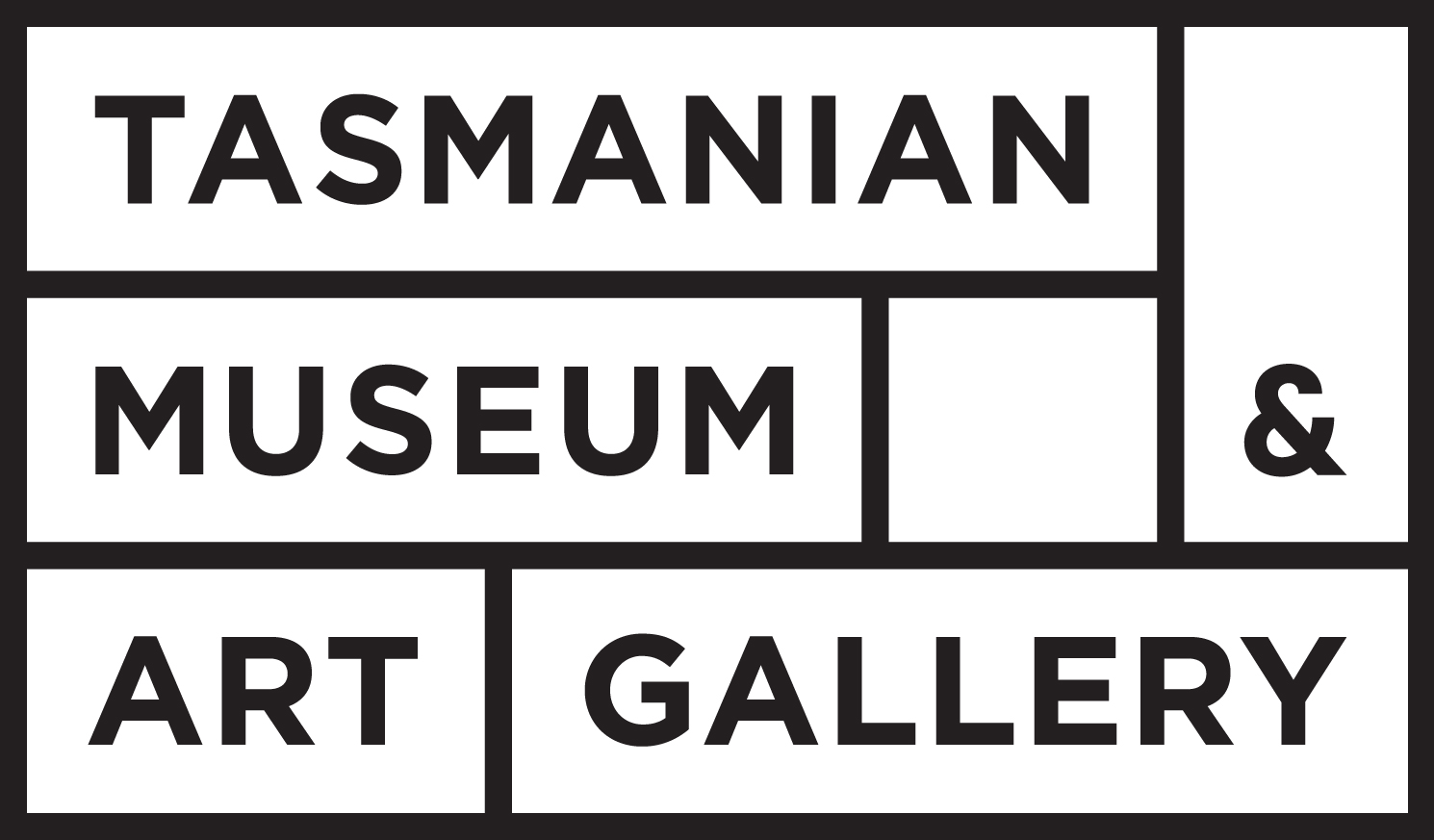 Early Career Networking Event Early Career Networking EventLocation: Tasmanian Museum and Art GalleryEarly career attendees are invited to bring an invited guest to a networking event at the Tasmanian Museum and Art Gallery. Proudly sponsored by TMAGRead More → |
||
| 0800 – 1730 | Registration Open – Mezzanine Foyer | ||
| Grand Ballroom | |||
| Regional observations and programmes Chair: Juan Hofer, Pontificia Universidad Catolica De Valparaiso |
|||
| 0830 – 0930 | 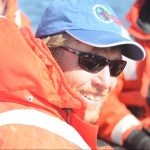 Plenary: Prof Oscar Schofield Rutgers University, USA Oscar M.E. Schofield, is a distinguished professor and the chair of the Department of Marine and Coastal Sciences at Rutgers, The State University of New Jersey. He is interested in how plankton dynamics structure marine food webs and feedback on the ocean’s biogeochemistry. Read More → |
||
| Equity, Diversity and Inclusion in Southern Ocean Research Chair: Steve Diggs, University of California San Diego |
|||
| 0930 – 0942 | 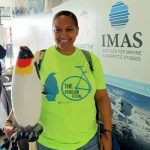 Plenary: Kimberly Aiken Plenary: Kimberly AikenUniversity of Tasmania Kimberly is a PhD student at UTAS, Institute for Marine and Antarctic Studies, undertaking a research project focused on building more diverse, equitable, and inclusive extreme and remote workforces with lessons from Antarctica, Outer Space and Underground Mining using intersectionality to examine overlapping identities such as race and gender to promote recruitment and retention of historically underrepresented groups.Read More → |
||
| 0942 – 0954 | 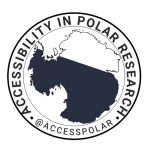 Plenary: Angus Aldis Plenary: Angus Aldis Accessibility In Polar Research Navigating polar science is tricky, especially for researchers with disabilities. Issues persist that disqualify researchers with disabilities from pursuing their dreams. To address this, Accessibility in Polar Research (APR/@accesspolar) was founded during the pandemic by a small group of researchers with disabilities.Read More → |
||
| 0954 – 1006 | 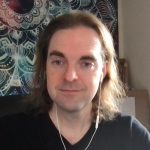 Plenary: Dani Jones Plenary: Dani Jones British Antarctic SurveyDr Dani Jones is a Physical Oceanographer and a UKRI Future Leaders Fellow at the British Antarctic Survey. Their research focuses on using numerical modeling (including adjoint modeling) and unsupervised classification to gain insight into ocean structure and dynamics.Read More → |
||
| 1006 – 1018 |  Plenary: Emma Robertson Plenary: Emma Robertson Penn State UniversityEmma is a PhD student and NSF Graduate Research Fellow in Geography & Climate Science at Pennsylvania State University. Emma’s work centers on the intricate relationship between atmospheric rivers, ice sheet-climate dynamics, and their impacts on West Antarctica.Read More → |
||
| 1018 – 1030 | 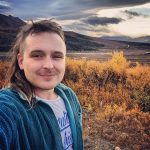  Plenary: Alex Thornton Plenary: Alex Thornton Pride in Polar ResearchAlex Thornton is the founder of Pride in Polar Research (PiPR), a global, volunteer-run group that supports, uplifts, and creates community for those with minority LGBTQIA+ identities in polar science. As an openly queer, intersex, and disabled marine scientist and educator from an international, multicultural family, he is deeply committed to creating access and equity for underrepresented communities in STEM, particularly for those at the intersectionality of marginalization.Read More → |
||
| 1030 – 1100 | Morning Refreshments | ||
| 1100 – 1300 | New insights and cross-disciplinary observing requirements for (circum-)Antarctic sea-ice processes | Regional ocean observing and modelling system developments in the Ross Sea sector | Distributed research efforts from the Scotia Arc through the West Antarctic shelf seas |
| Grand Ballroom 1 Chairs: Sian Henley, Klaus Meiners, Petra Heil, Marc Mallet, Marcello Vichi |
Grand Ballroom 2 Chairs: Craig Stevens, Minkyoung Kim, Zhaomin Wang, Denise Fernandez |
Grand Ballroom 3 Chairs: Andy Thompson, Pierre Dutrieux, Oscar Schofield, Juan Hofer |
|
| 1100 – 1115 | Remotely-sensing the wave-affected Antarctic marginal ice zone using pulse-limited radar altimeters Dr Alexander Fraser Australian Antarctic Program Partnership |
A Conceptual Model for a U.S. Ross Sea Internationally Coordinated Research Network Dr Sharon Stammerjohn University of Colorado Boulder |
Atmospheric forcing of interannual variability in Amundsen Sea basal melt rates Ole Rieke Institute For Marine And Antarctic Studies, University of Tasmania |
| 1115 – 1130 | Wave-Affected Marginal Ice Zones in Southern Ocean from Satellite Altimeters – A Study of the Indian Sector in July, 2017 Dr Shiming Xu Tsinghua University |
Connection of Dense Shelf Water Variability in the Western Ross Sea to the Southern Annular Mode Dr Zhaoru Zhang Shanghai Jiao Tong University |
Ecological Response to “Press-Pulse” Disturbances Along a Rapidly Changing West Antarctic Peninsula Prof Oscar Schofield Rutgers University |
| 1130 – 1145 | Waves and sea-ice in the Marginal Ice Zone: from observations to model Joey Voermans University of Melbourne |
Heat and water masses distribution in the Ross Sea from observations and model simulations Denise Fernandez National Institute Of Water And Atmospheric Research (NIWA) |
FjordPhyto, a citizen science platform that enhances spatial and temporal coverage of nearshore phytoplankton research on the Antarctic Peninsula Martina Mascioni Universidad Nacional De La Plata |
| 1145 – 1200 | A novel system for quantitative sampling of sub-ice platelet layers Natalie Robinson NIWA |
The salinity budget of the Ross Sea continental shelf, Antarctica Liangjun Yan Hohai University/NIWA |
Small scale bottom up controls of foraging behavior in a biological hotspot Dr Matthew Oliver University of Delaware |
| 1200 – 1215 | Using historical data compilations and novel methods to improve observational coverage of Southern Ocean sea-ice biogeochemical properties Dr Klaus Meiners Australian Antarctic Division |
The Terra Nova Bay Polynya activity in the new coupled model Polar-SKRIPSv1 Dr Alena Malyarenko NIWA |
Quantifying Physical Prey Concentrating Features in Palmer Deep, Antarctica Jacquelyn Veatch Rutgers University |
| 1215 – 1230 | An international circumpolar compilation of macronutrient concentrations in Antarctic land-fast sea ice: science highlights and open access data Dr Sian Henley University of Edinburgh |
Controls of topographic Rossby wave properties and downslope transport in dense overflows Prof Zhaomin Wang Southern Marine Science And Engineering Guangdong Laboratory (zhuhai) |
Examining the Connectivity of Antarctic Krill on the West Antarctic Peninsula: Implications for Pygoscelis Penguin Biogeography and Population Dynamics Dr Katherine Gallagher Stony Brook University |
| 1230 – 1245 | Is marginal sea ice a source of Fe and impacts productivity in South Atlantic? Prof Alakendra Roychoudhury Stellenbosch University |
Observing ice shelf ocean cavity hydrography: The Ross Ice Shelf Prof Craig Stevens NIWA/ University of Auckland |
Are biological hotspots farms or markets? The importance of resource retention for maintaining an Antarctic biological hotspot.Dr Matthew Oliver University of Delaware |
| 1245 – 1300 | Seasonal cycling of Fe in the marginal ice zone of Southern Ocean around zero meridian: linkage to phytoplankton bloom Dr Saumik Samanta Stellenbosch University |
Phytoplankton seasonal cycle and carbon export in the Ross Sea: A modeling study Prof Eileen Hofmann Old Dominion University |
Plankton diversity and dynamics in the upper surface of the Indian sector of Southern Ocean ecosystem: biogeochemical implications Athirpankandi Sreerag National Centre For Polar And Ocean Research |
| 1300 – 1400 | Lunch Weddell Sea and Dronning Maud Land Regional Working Group Meeting – Grand Ballro0m 2 Southern Ocean Indian Sector Regional Working Group Meeting – Grand Ballroom 3 |
||
| 1400 – 1530 | Southern Ocean sea ice variability in a warming climate: observations and modeling approach | Regional ocean observing and modelling system developments in the Ross Sea sector | Observing, mapping and monitoring Antarctic, seafloor fauna and their habitat |
| Grand Ballroom 1 Chairs: Petra Heil, Marcello Vichi |
Grand Ballroom 2 Chairs: Craig Stevens, Minkyoung Kim, Zhaomin Wang, Denise Fernandez |
Grand Ballroom 3 Chairs: Jan Jansen, Nicole Hill |
|
| 1400 – 1415 | Does the recent decline in Antarctic sea ice indicate a climate shift? Insights from satellite observations,Argo floats, and model reanalysis Kshitija Suryawanshi National Centre For Polar And Ocean Research |
Summer physical and biogeochemical conditions in Ross Sea polynya from glider data Esther Portela Rodriguez University of East Anglia |
The International Bathymetric Chart of the Southern Ocean Patrick Schwarzbach Alfred Wegener Institute, Helmholtz Centre for Polar and Marine Research |
| 1415 – 1430 | Novel model of sea ice growth to improve observing system for Antarctic polynyas Dr Igor Appel TAG |
Observing zooplankton and Antarctic silverfish in the Ross Sea Dr Svenja Halfter NIWA |
A circumpolar benthic bioregionalisation for the Antarctic continental shelf derived from seafloor imagery Dr Nicole Hill University of Tasmania/Institute for Marine and Antarctic Studies |
| 1430 – 1445 | Variability and trends of the Antarctic marginal ice zone Prof Marcello Vichi University of Cape Town |
The net community production and phytoplankton community changes at the Ross Sea Prof Yonghui Gao Shanghai Jiaotong University |
The circum-Antarctic distribution of seafloor biodiversity: Identifying hotspots of seafloor biodiversity and priorities for future research cruises Jan Jansen University of Tasmania |
| 1445 – 1500 | Antarctic snow depth, ice thickness and ice volume variability in the context of the 2022 and 2023 record minimum extent Dr Sahra Kacimi Jet Propulsion Laboratory |
Spatio-temporal variation of glacial meltwater and its influences on the continental shelf region of the Ross Sea Prof Seung-Tae Yoon Kyungpook National University |
Identifying Vulnerable Marine Ecosystems in the Southern Ocean: circumpolar model prediction and vulnerability index quantification Charley Gros Institute for Marine and Antarctic Studies, University of Tasmania |
| 1500 – 1515 |
Polardex/DueSouth Workshop |
Long-term moored observations of export and exchange from the northwestern Ross Sea Dr Melissa Bowen University of Auckland |
The muddy road to forecast distribution patterns of polychaete communities (taxonomic and functional groups) on the Weddell Sea Shelf Friederike Weith University of Rostock |
| 1515 – 1530 | Sea Surface Height Signature of the Dense Water Overflows in the Ross Sea Paul Spence University of Tasmania |
||
| 1530 – 1600 | Afternoon Refreshments | ||
| Data Systems Chair: Petra ten Hoopen, UK Polar Data Centre, BAS |
|||
| 1600 – 1700 |  Plenary: Vito Vitale (Virtual) CNR Institute of Polar Sciences, Italy Vito Vitale is Research Director at the CNR Institute of Polar Sciences (ISP) in Bologna. He has been involved in polar research and management since 1986, both in Antarctica and in the Arctic. He is an expert of radiative transfer processes into the atmosphere.Read More → |
||
| 1700 – 1830 |  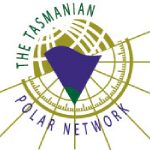 Poster Session Poster SessionLocation: Federation Ballroom, Hotel Grand Chancellor HobartAuthors will stand by their poster for the duration of this session to answer questions and discuss. Proudly sponsored by the Tasmanian Polar Network Read More → |
||
| 0800 – 1730 | Registration & Exhibition Open – Mezzanine Foyer | ||
| Grand Ballroom | |||
| Impact of observations in policy and societal challenges Chair: Sian Henley, University of Edinburgh & Jilda Caccavo, Institute Pierre-Simon Laplace |
|||
| 0830 – 0930 | 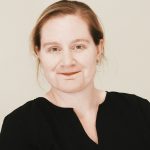
Plenary: Indi Hodgson-Johnston Indi is the ACEAS Chief Operating Officer and is an Adjunct Senior Researcher in Antarctic and oceans law and policy at the Institute for Marine and Antarctic Studies at the University of Tasmania. She also works as a rapporteur at the Antarctic Treaty Consultative Meetings, and is Senior Deputy Chair of the Tasmanian Polar Network Executive. |
||
| 0930 – 1000 | Panel: Indi Hodgson-Johnston (ARC Australian Centre For Excellence In Antarctic Science), Tony Press (IMAS, University of Tasmania) & Mary-Anne Lea (IMAS, University of Tasmania) | ||
| 1000 – 1030 | Morning Refreshments | ||
| 1030 – 1230 | Emerging technologies enabling future Southern Ocean observations | Understanding the state and variability of Southern Ocean CO2 sea-air fluxes and carbon cycle | How Argo is transforming our understanding of the Southern Ocean in the global climate |
| Grand Ballroom 1 Chairs: Andreas Marouchos, Hui Sheng Lim, Christopher Moony, Oscar Schofield, Joellen Russell, Patrick Gorringe, Tommy Bornman, Juliet Hermes, Antonio Novellino |
Grand Ballroom 2 Chairs: Xiang Yang, Cathryn Wynn-Edwards, Elizabeth Shadwick |
Grand Ballroom 3 Chairs: Christina Schallenberg, Bea Pena-Molino, Annie Foppert, Laura Herraiz-Borreguero |
|
| 1030 – 1045 | Autosub Long Range vehicle 12 month deployment for the NERC Drivers of Oceanic Change in the Amundsen Sea (DeCAdeS) project Matthew Kingsland National Oceanography Centre |
Assessing decadal anthropogenic carbon dioxide changes in the Ross Sea with stable carbon isotope measurements Dr Keyhong Park Korea Polar Research Institute |
Polar Argo: current state, science highlights and technological advances Esmee van Wijk CSIRO Environment |
| 1045 – 1100 | Toothfish fishing vessels as vessels of opportunity Rhys Arangio COLTO |
Drivers of Marine CO2-Carbonate Chemistry in the Northern Antarctic Peninsula Thiago Monteiro FURG |
Observing dense shelf water in the ice-covered western Weddell Sea with intentionally-grounded Argo floats Dr Markus Janout Alfred Wegener Institute Helmholtz Centre For Polar And Marine Research |
| 1100 – 1115 | Ocean properties and variability in front and beneath the Dotson Ice Shelf: direct observations from autonomous gliders and float profilers Dr Pierre Dutrieux British Antarctic Survey |
Constraining the mechanisms of Southern Ocean dissolved iron distributions along GO-SHIP transect SR3 using optimum multiparameter analysis Christopher Traill IMAS-AAPP |
Properties and pathways of Antarctic Bottom Water from five years of Deep Argo in the Australian-Antarctic Basin Dr Annie Foppert AAPP |
| 1115 – 1130 | Adaptive information gathering in the Southern Ocean using a team of autonomous vehicles Dr Hui Sheng Lim Commonwealth Scientific and Industrial Research Organisation (CSIRO) |
Interaction between multiple physical particle injection pumps and the impact on carbon export in the Southern Ocean Dr Andrew Thompson California Institute of Technology |
Antarctic sea ice formation and melt rates estimated from under-ice Argo observations Ethan Campbell University of Washington |
| 1130 – 1145 | An array of in situ waves-in-ice instruments deployed during targeted observational experiment in winter 2022 in the Antarctic MIZ Robyn Verrinder University of Cape Town |
Exploring the euphotic zone residence time for lower cell water mass Yinghuan Xie UTAS IMAS |
The drivers of Winter Water’s spatiotemporal variability over the annual cycle Theo Spira Universitet |
| 1145 – 1200 | Observing the Ocean and Earth with SMART Subsea Cables Ceci Rodriguez Joint Task Force Smart Cable |
A meta-analysis of studies comparing profiling float pCO2 estimates with independent observations Dr Kenneth Johnson MBARI |
Poleward shift of Circumpolar Deep Water threatens the East Antarctic Ice Sheet Laura Herraiz Borreguero CSIRO |
| 1200 – 1215 | SMART Cables potential for the National Tsunami Warning Centers Matias Sifon Servicio Hidrografico Y Oceanografico De La Armada De Chile |
The Southern Ocean Carbon Gas Observatory (SCARGO) : an airborne platform for improving observational constraints on Southern Ocean CO2 fluxes Jesse Vance NCAR | UCAR |
An updated Gravest Empirical Mode climatology – utilising the wealth of Southern Ocean observations Nathan Bindoff Institute for Marine and Antarctic Studies |
| 1215 – 1230 | Enabling Science with a Subsea Fiber Optic Cable for McMurdo Station, Antarctica David Porter National Science Foundation |
Preliminary Results from the International Nutrient Inter-Comparison Voyage: Reducing Uncertainty in at-sea Nutrient Measurements Dr Harris Anderson CSIRO |
Insight into Southern Ocean eddies from Historical observations Dr Ramkrushnbhai Patel University of Tasmania |
| 1230 – 1330 | Lunch Ross Sea Land Regional Working Group Meeting – Grand Ballroom 3 |
||
| 1330 – 1530 | Emerging technologies enabling future Southern Ocean observations / Reshaping long-term observatories with focus on Antarctic and Southern Ocean: drivers, implementation and outcome | Observations to improve predictions of Southern Ocean ecosystems in the global context |
How Argo is transforming our understanding of the Southern Ocean in the global climate |
| Grand Ballroom 1 Chairs: Petra Heil, Anna MacDonald, Julie McInnes |
Grand Ballroom 2 Chairs: Stuart Corney, Eileen Hofmann, David Green |
Grand Ballroom 3 Chairs: Christina Schallenberg, Bea Pena-Molino, Annie Foppert, Laura Herraiz-Borreguero |
|
| 1330 – 1345 | Simulating phytoplankton movement within the surface mixed layer to characterise the Southern Ocean spring bloom onset Tamara Schlosser University of Tasmania – ACEAS |
KRILLPODYM: a mechanistic, spatially resolved model of Antarctic krill distribution and abundance Dr David Green IMAS University of Tasmania |
SOCCOM (Southern Ocean Carbon and Climate Observations and Modeling): Biogeochemical Argo, State Estimation and Earth System Modeling Professor Lynne Talley Scripps Institution of Oceanography, UCSD |
| 1345 – 1400 | Using Ship-Deployed High-Endurance Uncrewed Aerial Vehicles for the Study of Ocean/Ice Surface and Atmospheric Boundary Layer ProcessesChristopher J Zappa Lamont-Doherty Earth Observatory of Columbia University |
Krill Growth Rates and Environmental Drivers in the Southern Ocean: Implications for Ecosystem Management and SustainabilityJessica Melvin Institute For Marine And Antarctic Studies, University of Tasmania |
Southern Ocean Biological Response to Dust Quantified by BGC-Argo Observations Jakob Weis IMAS |
| 1400 – 1415 | The Southern Ocean Time Series – what can we learn from a decade of deep-water mooring observations? Dr Elizabeth Shadwick CSIRO |
Decadal timeseries of animal tracking, isotopes and biogeochemical modelling to simulate regional ecosystem variability in the Southern Ocean Professor Mary-Anne Lea IMAS, University of Tasmania |
Sea Surface Kinetic Energy as a Proxy for Phytoplankton Light Limitation in the Summer Pelagic Southern Ocean Dr Matthew Oliver University of Delaware |
| 1415 – 1430 | Autonomous ocean-sea ice-atmosphere observatory for the Southern Ocean Dr Petra Heil AAD & AAPP, University of Tasmania |
Lessons from the Marine Ecosystem Assessment for the Southern Ocean (MEASO) on measuring biological “sentinel” variables to support decision making Andrew Constable University of Tasmania |
What lies beneath? Deep diatom communities are observed across the Southern Ocean Kimberlee Baldry University of Tasmania |
| 1430 – 1445 | The South African Polar Research Infrastructure Prof Juliet Hermes South African Environmental Observation Network |
Satellite products and services for collection and delivery of essential observations of the Southern Ocean Oliver Palin CLS Oceania |
The Effects of Mesoscale Eddies on Southern Ocean Biogeochemistry Dr Lydi Keppler Scripps Institution of Oceanography |
| 1445 – 1500 | Macquarie Island Wildlife Monitoring Program: strategic monitoring for applied conservation and management Kris Carlyon Department of Natural Resources and Environment Tasmania |
The Humpback Whale Sentinel Programme; Biomonitoring for Ecosystem and Chemical Surveillance Prof Susan Bengtson Nash Griffith University |
Southern Ocean Acidification Revealed by Biogeochemical-Argo Floats Ariane Verdy Scripps Institution of Oceanography, UCSD |
| 1500 – 1515 | Bringing together approaches to reporting on within-species genetic diversity Dr Anna Macdonald Australian Antarctic Division |
Using satellites to monitor catastrophic breeding failures at emperor penguin colonies linked to historic low sea ice extents Dr Peter Fretwell British Antarctic Survey |
Subantarctic pCO2 estimated from a biogeochemical float: comparison with moored observations reinforces the importance of spatial and temporal variability Dr Cathryn Wynn-Edwards CSIRO, AAPP, IMAS |
| 1515 – 1530 | DNA-based diet analysis of subantarctic predators to assess Southern Ocean food-web linkages and ecosystem change Dr Julie McInnes Institute For Marine And Antarctic Studies |
Modelling the krill-centred ecosystem: how far can we push it? Dr Stuart Corney Institute For Marine And Antarctic Studies |
Under-ice Float Observations from the SOCCOM Array: Examples and Climatologies Dr Stephen Riser University of Washington |
| 1530 – 1600 | Afternoon Refreshments | ||
| New observing technology and systems in Southern Ocean observations Chair: Andreas Marouchos, CSIRO |
|||
| 1600 – 1700 | 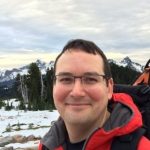 Plenary: Noah Lawrence-Slavas National Oceanic and Atmosphere Administration (NOAA), USA Noah Lawrence-Slavas is the principle mechanical engineer for the NOAA’s Pacific Marine Environmental Laboratory where he leads diverse engineering teams, collaborating with principle scientific investigators, to innovate and develop new tools for scientific research. Read More → |
||
| 1830 – 2300 | 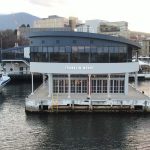
Symposium Dinner This will be a night for networking and savouring the fine Tasmanian produce the state has become known for. Franklin Wharf is a short 5 minute scenic walk from the Symposium Venue along Hobart’s waterfront, a working port and home to the Antarctic icebreaker, Nuyina. After the Symposium dinner, you can continue enjoying Hobart’s hospitality at the adjacent restaurant/bar precinct Salamanca. |
||
| 0900 – 1800 | Registration & Exhibition Open – Mezzanine Foyer | ||
| Grand Ballroom | |||
| Southern Ocean in the Global UN Ocean Decade Chair: Eileen Hofmann, Old Dominion University |
|||
| 0930 – 0944 | 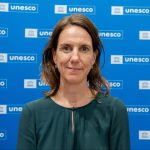 Plenary: Alison Clausen Plenary: Alison ClausenIntergovernmental Oceanographic Commission of UNESCOAlison Clausen is the Deputy Global Coordinator of the UN Decade of Ocean Science for Sustainable Development at IOC-UNESCO. She joined IOC as a programme specialist in 2019 with over twenty-five years’ professional experience in program and project development and management in the areas of marine conservation, marine policy, and climate change adaptation.Read More → |
||
| 0944 – 0958 | 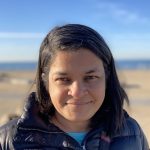
Plenary: Renuka Badhe As a knowledge broker with a background in oceanography, economics and public policy, she has longstanding expertise working with a wide range of international organisations and projects at the interface of science, policy and/or strategy development or overlaps thereof. |
||
| 0958 – 1012 | 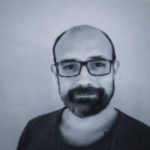 Plenary: Anton Van de Putte Royal Belgian Institute of Natural Sciences, Belgium Dr Anton Van de Putte is a marine biologist and open science advocate who obtained a PhD from the KULeuven working on the ecology and evolution of Antarctic fish. During his PhD he developed a strong interest in the Antarctic treaty system and its spirit of cooperation.Read More → |
||
| 1012 – 1026 | 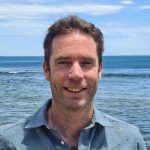 Plenary: Stuart Corney Institute for Marine and Antarctic Studies, University of Tasmania, Australia Dr Stuart Corney is a senior lecturer and Associate Head Learning and Teaching at the Institute for Marine and Antarctic Studies at the University of Tasmania. Stuart’s research focuses on the interface between the physical environment and ecosystem dynamics. Read More → |
||
| 1026 – 1040 | 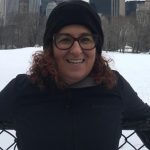 Plenary: Karen Evans CSIRO, Australia Dr Evans is a principal research scientist and team leader with CSIRO Oceans and Atmosphere based in Hobart, Tasmania. Her projects deliver strategic research to national agencies, regional programmes in the Pacific and Indian Oceans and international agencies, including the United Nations. Read More → |
||
| 1040 – 1130 | Panel: Renuka Badhe (European Polar Board, Netherlands), Anton Van de Putte (Royal Belgian Institute of Natural Sciences, Belgium), Stuart Corney (Institute for Marine and Antarctic Studies, University of Tasmania, Australia), Karen Evans (CSIRO, Australia) and Sian Henley (University of Edinburgh, United Kingdom) | ||
| 1130 – 1230 | Lunch Southern Ocean Air-Sea Fluxes Capability Working Group Meeting – Grand Ballroom 3 Censusing Animal Populations from Space Capability Working Group Meeting – Chancellor 5 |
||
| 1230 – 1445 | Southern Ocean plankton: productivity, diversity, food-web dynamics, time-series & biogeochemistry | Air-sea interactions and climate variability in the Southern Ocean | Circumpolar Antarctic Ice Sheet-Ocean observations: towards an integrated view and improved climate models |
| Grand Ballroom 1 Chairs: Sarat Chandra Tripathy, Ruth Eriksen, Toru Hirawake, Kazuhiro Yoshida, Kerrie Swadling, Luke Brokensha |
Grand Ballroom 2 Chairs: Marcel du Plessis, Luciano Pezzi |
Grand Ballroom 3 Chairs: Andrew Meijers, Markus Janout, Felicity McCormack, Sue Cook, Pierre Dutrieux |
|
| 1230 – 1245 | Under-ice phytoplankton in autumn uncovered by southern elephant seals in the East Antarctic Laura Dalman University of Tasmania |
Impact of a melting ‘megaberg’ on water column hydrography in the Southern Ocean Dr Alexander Brearley British Antarctic Survey |
Antarctic RINGS to characterise the Antarctic Ice Sheet coastal zone and Antarctica’s contribution to sea-level rise Dr Felicity Mccormack |
| 1245 – 1300 | Trends in Southern Ocean phytoplankton iron stress, primary production and bloom phenology Dr Sandy Thomalla CSIRO |
High Salinity Shelf Water production in Terra Nova Bay, Ross Sea from high-resolution near-surface salinity observationsChristopher J Zappa Lamont-Doherty Earth Observatory of Columbia University |
NECKLACE: Collating a circum-Antarctic dataset of ice shelf basal melt Dr Sue Cook |
| 1300 – 1315 | Variations in the particle size distribution and chlorophyll-to-carbon ratio in the Southern Ocean Juan Li Curtin University |
Long term spatiotemporal trends in chlorophyll-a and sea surface salinity in Southern Ocean and their association with aerosol nutrients Dr Salman Tariq University of the Punjab |
Western Ross Sea ice tongues sentinels of oceanographic change Rodrigo Gomez Fell University of Canterbury |
| 1315 – 1330 | Bottom-up controls on summer phytoplankton dynamics in the surface waters of the Gerlache-Bismarck Strait area, Western Antarctic PeninsulaDr Juan Höfer Pontificia Universidad Catolica De Valparaiso |
High-resolution thermal imaging in the Antarctic Marginal ice zone: Ocean skin heterogeneity and effects on heat fluxesIppolita Tersigni The University of Melbourne |
Subglacial freshwater drainage increases simulated basal melt of the Totten ice shelf Dr David Gwyther University of Queensland |
| 1330 – 1345 | Low-Fe availability reduces the photosynthetic competency of ice algae upon discharge from sea ice Dr Kazuhiro Yoshida Saga University |
Water mass and heat flux exchanges between the Southern Ocean and Antarctic seas, East Antarctica Dr Libao Gao First Institute of Oceanography |
Seafloor roughness reduces melting of the Antarctic ice sheets Yuhang Liu University of Tasmania |
| 1345 – 1400 | Contrasting phytoplankton communities between Cape Darnley and Dalton Polynyas, off East Antarctica, during sea-ice melting and forming seasons Dr Keigo Takahashi Soka University |
ACC Meanders Enhance Air-Sea Heat Flux Exchange and Water Subduction Felipe Vilela-Silva UTAS, CLEX, AAPP |
Internal tsunamigenesis and ocean mixing driven by glacier calving in Antarctica Dr Alexander Brearley British Antarctic Survey |
| 1400 – 1415 | Bio-optical Depiction of a Polar Ocean Under Global Change: Exploring the Regional Absorption Traits Dr Sarat Chandra Tripathy National Centre for Polar and Ocean Research (NCPOR) |
Summer upper ocean warming controlled by storms in the subpolar Southern Ocean Dr Marcel Du Plessis University of Gothenburg |
Sea ice – ocean – land ice: interacting processes in the western Ross Sea observed by airborne geophysics Prof Wolfgang Rack University of Canterbury |
| 1415 – 1430 | Living on the edge: response of deep phytoplankton communities to light, iron and manganese additions Dr Pauline Latour ACEAS, UTAS |
Storm’s role for air-sea CO2 exchange in the Southern Ocean Magdalena Carranza Monterey Bay Aquarium Research Institute |
A connected circulation system of the West Antarctic shelf seas Dr Andrew Thompson California Institute of Technology |
| 1430 – 1445 | Physical-biological drivers modulating phytoplankton seasonal succession along the Northern Antarctic Peninsula Raul Rodrigo Costa FURG |
An ensemble-based Data Assimilation System for the Southern Ocean (DASSO) Prof Qinghua Yang Sun Yat-sen University |
Poleward transport of mCDW mediated by standing eddies in Southern Ocean Indian Sector Dr Kohei Mizobata Tokyo University of Marine Science and Technology |
| 1445 – 1515 | Afternoon Tea |
||
| 1515 – 1800 | Southern Ocean plankton: productivity, diversity, food-web dynamics, time-series & biogeochemistry / Processes and ecosystem response of the Southern Ocean | Circumpolar Antarctic Ice Sheet-Ocean observations: towards an integrated view and improved climate models | Taking the pulse on the Southern Ocean: an internationally coordinated, circumpolar, and year-round mission |
| Grand Ballroom 1 Chairs: Sarat Chandra Tripathy, Ruth Eriksen, Toru Hirawake, Kazuhiro Yoshida, Kerrie Swadling, Luke Brokensha, Svenja Halfter |
Grand Ballroom 2 Chairs: Andrew Meijers, Markus Janout, Felicity McCormack, Sue Cook, Pierre Dutrieux |
Grand Ballroom 3 Chairs: Alexander Haumann, Stuart Corney, Petra Heil, Clive McMahon, Stefanie Arndt |
|
| 1515 – 1530 | Subantarctic and Antarctic Peninsula Sediment Trap Water Soluble Organic Matter Characterization: Insights from Ultrahigh Resolution Mass Spectrometry Heather Forrer EOAS Dept, Florida State University |
Understanding the Southern Ocean through model-data synthesis Yoshihiro Nakayama Hokkaido University |
3.15 – 3.23 Introduction & Workshop Overview 3.23 – 3.31 The Polar POD expedition: a multi-year research voyage around the Southern Ocean Prof David Antoine Curtin University |
| 1530 – 1545 | Has the calving of the Mertz Glacier Tongue affected zooplankton community structure in a region of variable fast ice? Sylvie King Institute For Marine And Antarctic Studies, University of Tasmania |
Ocean ridges impact the strength and location of deep warming and sea level changes Dr Kathryn Gunn CSIRO Environment |
3.31 – 3.39 Bridging the gap for ice-ocean-ecosystem processes: Case Studies Integrated Observatory for the far East Antarctica-Ross Sea Region RSfEAR Dr Petra Heil AAD & AAPP, Univerity of Tasmania3.39 – 3.47 The Norwegian Troll Observing Network marine observatories Tore Hattermann Norwegian Polar Institute |
| 1545 – 1600 | Using novel methods to detect ecological changes in species communities of the Southern Ocean. Yash Gimonkar Institute For Marine And Antarctic Studies (IMAS, UTAS) |
Drivers of change in Antarctic Bottom Water and the deep overturning circulation Dr Steve Rintoul CSIRO |
3.47 – 3.55 Seasonal sea ice and snow properties as sensitive indicators for a changing Antarctic sea ice cover Dr Stefanie Arndt Alfred-Wegener-Institut Helmholtz-Zentrum für Polar- und Meeresforschung3.55 – 4.03 Closing the Southern Ocean heat and carbon budgets and understanding the underlying processes Alexander Haumann Alfred Wegener Institute / Ludwig-Maximilian-University Munich |
| 1600 – 1615 | Long-term continuous plankton recorder data and joint species distribution models reveal changes in zooplankton communities in the Southern Ocean Dr Joel Williams IMAS, University of Tasmania |
Abyssal ocean overturning slowdown and warming driven by Antarctic meltwater Prof Matthew England University Of New South Wales |
4.03 – 4.11 Observing water mass exchange across the Antarctic continental slope Dr Markus Janout Alfred Wegener Institute Helmholtz Centre For Polar And Marine Research4.11 – 4.20 Questions & Discussion |
| 1615 – 1630 | The Influence Of Feculence: Swimming Behaviour And Grazing Rate Changes Of Antarctic Krill (Euphausia Superba) In The Presence Of Guano Dr Nicole Hellessey Georgia Institute of Technology |
How to in SOOSmap Workshop |
4.20 – 5.25 Breakout Discussion |
| 1630 – 1645 | Long term monitoring of Southern Ocean plankton using the Continuous Plankton Recorder program Luke Brokensha Institute For Marine and Antarctic Studies |
4.20 – 5.25 Breakout Discussion |
|
| 1645 – 1700 | Up, down, and sideways: Antarctic krill (Euphausia superba) swimming behaviour in differing flow, light and chemical cue conditions Dr Nicole Hellessey Georgia Institute of Technology |
4.20 – 5.25 Breakout Discussion |
|
| 1700 – 1715 | Impacts of recent Antarctic Sea-Ice Extremes Dr Edward Doddridge AAPP |
Data Surgery Are you using scientific data in your research and struggling to find the data you need? Are you unsure how to handle your data or need some advice on how to best share your data? A friendly team of data professionals from a number of data centres and data programmes with data management expertise will be happy to brainstorm a solution with you. |
4.20 – 5.25 Breakout Discussion |
| 1715 – 1730 | Spatiotemporal variability of dissolved inorganic macronutrients along the northern Antarctic Peninsula Thiago Monteiro FURG |
5.25 – 5.433-Minute summaries from breakouts | |
| 1730 – 1745 | Using a high-resolution model to understand changes in distribution of crabeater seals linked to climate change in the Southern Ocean Denisse Fierro Arcos University of Tasmania |
5.25 – 5.43 3-Minute summaries from breakouts |
|
| 1745 – 1800 | Observed Intrusion of Warm Modified Circumpolar Deep Water and Its Impact on Dense Shelf Water Formation Guijun Guo First Institute Of Oceanography, Ministry of Natural Resources |
5.45 – 6.00 Joint Discussion |
|
| 0800 – 1300 | Registration Open – Mezzanine Foyer | ||
| Grand Ballroom | |||
| Gaps and next steps for the Southern Ocean observing system Chair: Craig Stevens, Niwa/University of Auckland |
|||
| 0830 – 1000 | Short presentations and panel discussion with key observing initiatives | ||
| 1000 – 1030 | Morning Refreshments | ||
| Gaps and next steps for the Southern Ocean observing system Chair: Luciano Pezzi, National Institute For Space Research – INPE |
|||
| 1030 – 1036 | 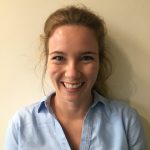 ECR Perspective: Kathy Gunn CSIRO Environment Kathy’s research aims to understand the drivers of ocean warming and freshening in the Southern Ocean. In this remote region, certain areas are experiencing accelerated trends, but it remains difficult to collect enough data to observe the ocean’s true variability. Read More → |
||
| 1036 – 1042 |  ECR Perspective: Ethan Campbell ECR Perspective: Ethan CampbellUniversity of WashingtonEthan Campbell is a Ph.D. candidate in physical oceanography at the University of Washington in Seattle. His dissertation research is focused on open-ocean polynyas, sea ice growth and melt, and snow processes in the Southern Ocean. Ethan has served as an APECS ECR representative on the SOOS Weddell Sea–Dronning Maud Land Regional Working Group since 2021. Read More → |
||
| 1042 – 1048 | 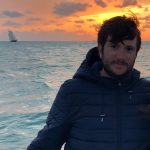 ECR Perspective: Alessandro Silvano ECR Perspective: Alessandro SilvanoUniversity of SouthamptonAlessandro is a NERC Independent Research Fellow at the University of Southampton (UK) studying the Southern Ocean and how it interacts with the climate system. Alessandro is particularly interested in understanding how these processes affect global sea level and ocean heat and carbon uptake.Read More → |
||
| 1048 – 1054 |  ECR Perspective: Minkyoung KimKyungpook National UniversityMinkyoung is a passionate early-career chemical oceanographer, working at Kyungpook National University as an assistant professor (tenure-track). By using the radiocarbon and lipid biomarkers, Minkyoung aims to obtain insights on carbon and related biogeochemical cycling in global oceans.Read More → |
||
| 1054 – 1100 | 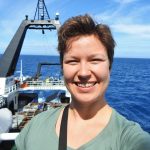 ECR Perspective: Svenja Halfter ECR Perspective: Svenja HalfterNIWASvenja Halfter is a zooplankton ecologist and biogeochemist based at NIWA in Wellington, New Zealand. Their research focuses on understanding the zooplankton dynamics and the impact of climate change on lower trophic levels in the Southern Ocean, mainly in the Indian and Pacific sectors. Read More → |
||
| 1100 – 1200 | 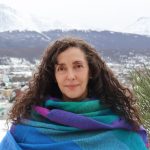 Plenary: Irene SchlossInstituto Antártico Argentino, ArgentinaDr. Irene Schloss is a biological oceanographer at Austral Center for Scientific Research from the National Council of Scientific Research (CONICET) in Ushuaia Argentina. She is also affiliated to Argentinean Antarctic Institute and the Tierra del Fuego National University.Read More → |
||
| 1200 – 1230 | Symposium Closing
Dr Alyce Hancock, Executive Officer SOOS |
||
